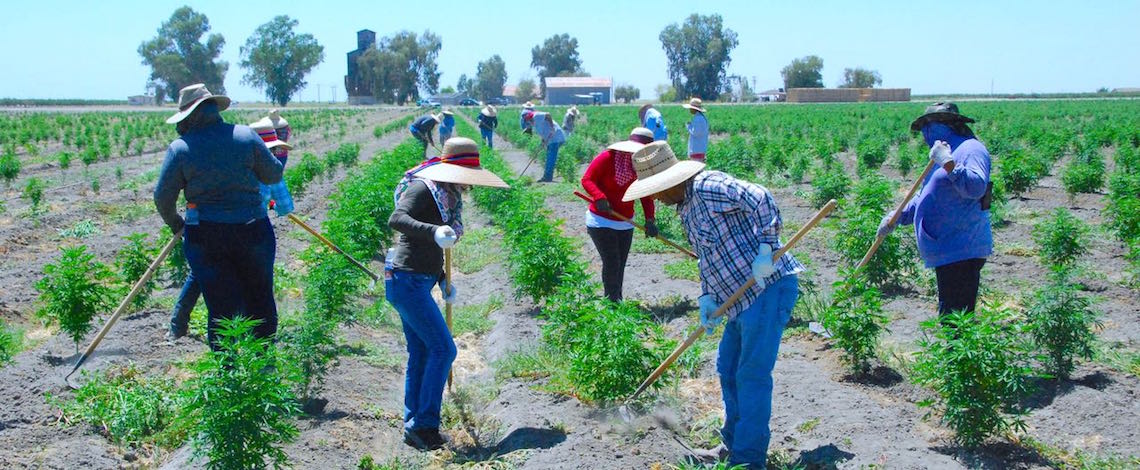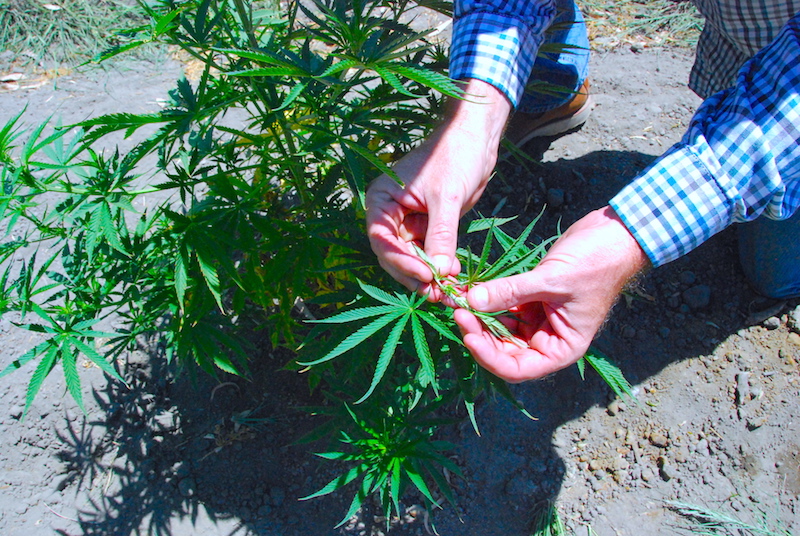
The Business Journal's coverage of the emerging hemp industry won a statewide award. 2019 file photo
Written by
After 25 years of lobbying and speaking before lawmakers in an effort to fully legalize commercial hemp, Charles Meyer was over the moon in December 2018 when federal lawmakers finally did it in the latest federal Farm Bill.
Now Meyer’s farm near Lemoore includes about 45 acres of hemp amid the cotton, alfalfa and nut crops that have been his farm’s primary crops.
Plans are to plant another 100 acres of hemp, while he and a group of at least six fellow farmers are forming a cooperative to promote their hemp and build a place to process their crops to remove the valuable CBD oil that can be used in a variety of goods from medicinal creams and other products to makeup.
“We’ve got it all organized already. We may be able to complete it this year,” Meyer said.
But even though the hemp no longer is listed as an illegal drug — as is its very similar cousin, marijuana — by the federal government, Meyer said he and others now working with hemp have encountered a new problem from banks and other lenders.

Sparking trouble
Back in January, Meyer said he approached Farm Credit West about a farm loan, “and they dropped me like a hot potato,” stating he couldn’t qualify to apply for a loan for his hemp-growing operations, though it would continue accepting payments on loans he already had with the bank.
“I tried to go to Bank of the West, and they would have nothing to do with it, and I went to Bank of the Sierra and got the same information,” said Meyer, who ended up going to a private investment firm to get a loan for his entire farming operation, including his hemp.
It’s not just hemp farmers having problems with banking and lending.
Steve M. Brooks doesn’t work directly with hemp, but the managing partner for West Coast Ag Advantage in Lemoore said he went to Bank of Sierra last month to deposit a $129,000 check from a client who grows hemp, and the teller noticed “hemp farm” written on the check’s memo line.
He said the teller warned him not to deposit the check with “hemp” written on it, so he went back to the farmer to get a new check with nothing in the memo line and went back to the bank the next day.
Closed accounts
But the damage was done, as the seemingly helpful teller had told her superiors about “hemp” being on the check, and Brooks was told that he not only couldn’t deposit the check, but his business account was going to be closed.
That led to a series of emails between the bank and Brooks, who challenged Bank of the Sierra’s decision.
That included Brooks forwarding via email a link to an online article in which Michelle W. Bowman, a member of the board of governors of the Federal Reserve, said during a Senate hearing in early June that her department would clarify to financial institutions that they could provide services to hemp-related business after senators cited hemp growers in their states having issues with banks.
When hemp was listed by the federal government as a controlled substance, banks, credit unions and other financial institutions couldn’t deal with hemp businesses, except in states where hemp could be grown under very restrictive conditions detailed in the 2014 Farm Bill, with California among those states.
In the case of marijuana-related businesses, even in California and other states that have legalized it, banks and similar financial institutions are prohibited from dealing with them because the federal government still lists pot as a controlled substance, which is why dispensaries and growing operations tend to be all-cash businesses.
Thanks, but no thanks
“I would like to thank you for reaching out and sharing this link with us. Bank of the Sierra is very aware of the rules and regulations regarding banking hemp-related businesses. We are also very much aware of the risks and the additional reporting and oversight required of the financial institution that chooses to bank hemp related businesses. We have assessed all of the guidelines provided by the FDIC and have chosen to institute a policy to not adopt this practice,” states an email sent to Brooks from Mona M Carr, whom it identified as
Bank of the Sierra‘s senior vice president, director of bank operations.
“I will review your account with the risk management team, but I anticipate that we will be closing your account in 10 days. Because marijuana-related businesses are still against federal law, and we now have knowledge that your business is associated with this illegal activity, we will be terminating our business relationship,” it continues.
After Brooks replied, “I have NOTHING to do with Marijuana,” and that working with hemp isn’t illegal, Carr emailed back, “I am very sorry you took my words that way. I am not accusing you of anything. The federal government has stated that any [marijuana-related business], which includes hemp, is not considered legal activity. We do not bank any business or person that has any activity, if we have knowledge related to marijuana, hemp, etc. That includes even security services that protect dispensaries, crops, etc. It includes those that lease, those that provide water, tools, any possible association. We, as a federally-insured financial institution, have absolutely no opinion on what is right and what is wrong regarding hemp products and/or marijuana. We have simply made the business decision to not accept the risk as we see it.”
In another email dated July 24, Carr wrote, “We had our Risk meeting tonight, and we cannot support keeping this account open having knowledge that the business is performing any type of activity related to marijuana, including hemp. The federal guidelines for federally insured banks in this matter is very strict. Although they allow us to bank businesses that deal with marijuana or hemp, the requirements that we are required to adhere to are prohibitive.”
More than due diligence
That last statement isn’t explained, and Bank of the Sierra officials declined to be interviewed for this story.
But it may refer to banks possibly having to perform added administrative tasks under federal guidelines to work with customers in the hemp industry, said Beth Mills, a spokeswoman for the Western Bankers Association, a Sacramento-based trade association representing banks in 14 Western states, most in California.
She said she wasn’t aware of banks refusing to serve hemp-related businesses, but noted banks can refuse to do business with anyone they don’t want to, citing how some banks will not work with gun manufacturers.
It’s the law
At least in most cases, not working with hemp farmers isn’t a matter of conflicting ideals, but the law, said Chris Brumsfield, executive vice president and general counsel for Rocklin-based Farm Credit West, which has offices in Dinuba and Tulare.
Even though hemp is legal on the books, the law isn’t being fully implemented in the same way as growing plums or almonds or lemons or most other crops.
Instead, the U.S. Food and Drug Administration has to approve and roll out its set of rules on hemp growing, which may not happen until the fall. After that, the federal government will have to review and approve additional hemp regulations from each state, which will include the individual states deciding whether they or the federal government will enforce hemp laws That process may not be done until late in the first quarter of next year, Brumsfield said, adding that once all this is done, the hemp industry would be federally compliant, which then would allow Farm Credit West or any other farm credit entity or bank to work with hemp-related businesses.
California has been issuing permits for hemp operations because it approved its own rules to allow hemp growing just before the new Farm Bill was passed, and both the state authorization and federal law change took effect at the start of this year. But that doesn’t allow banks and other lenders here to start working with customers growing hemp until after the federal rules are in place and after the federal government approves the state rules.
“We’re kind of handcuffed at this point until the federal law aspect of it is put into place and approved.”
Left unbanked
That’s small consolation for Brooks, who still has a $129,000 check he can’t cash, and he can’t use that money to pay bills for his 3-month-old business.
But while the law clearly prohibits his business from working with hemp producers, Brumsfield said there may be room to work with suppliers of goods and services for hemp growers, as well as manufacturers of hemp products, but each business would have to be considered individually.







